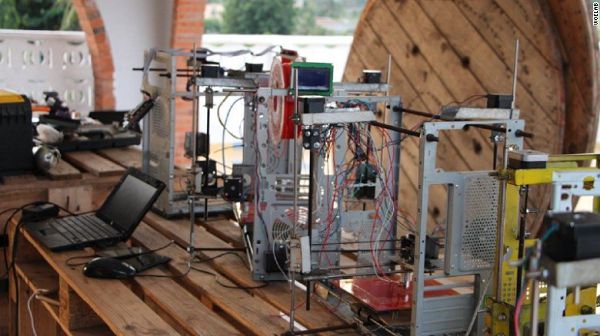
How a West African lab made a 3D printer from toxic e-waste
Electronic waste is (literally) a mounting crisis in Africa.
Digital dumps made of junk phones, computers and TVs shipped mostly from richer Western countries are growing across Africa, burned producing unhealthy and hazardous gasses.
The problem is only getting worse. Fortunately, though, there are those working at a community level to raise awareness about e-waste and put it to some good use.
An innovative lab in Lomé, the capital city of Togo in West Africa, is one such group.
They've created the first "Made in Africa" 3D printer using e-waste.
WoeLab, a community tech hub established by architect Sénamé Koffi Agbodjinou, 37, made the machine using little more than scrap printers, computers and scanners.
The idea was born after Agbodjinou purchased a 3D printer for the lab. Upon seeing this, the young innovators based at the workshop decided to build their own.
"We wanted to see how we could build a new one but with our own resources," Agbodjinou tells CNN.
In 2013, after a year of collaborative work, they had produced the first 3D printer. Now they have 20 finished products and other labs in Africa are following suit.
3D printing success
Innovators at WoeLab building 3D printers.
WoeLabs opened in 2012 and is a grassroots network of inventors and entrepreneurs who want to build a "digital democracy.
" For them, this starts with the 3D printer.
They're planning to place a 3D printer in every school within one km of the lab to foster technological learning.
"What we are concerned with is to try to create in the young people a confidence in themselves in their capacity to realise projects," Agbodjinou says.
Their machine is based on the RepRap low-cost 3D printing model, first designed by experts at the University of Bath.
It's capable of printing plastic objects within a size of 50cm cubed.
Technological enlightenment
While the 3D printer was a huge breakthrough for WoeLab, it is part of a much broader and bold ambition to make Africa a tech-centered continent.
"The idea is that the African city of tomorrow will be built by our own innovation spaces," Agbodjinou explains.
WoeLab has about 50 people working in the space, and a second lab opened in Lomé earlier this year.
There are 10 startups based in WoeLab pursuing projects ranging from building robots to tackling waste.
The future of the continent?
WoeLabs aren't the only technologists hoping to unlock the potential of 3D printing.
Students at Buni Hub, a mini fabrication lab in Tanzania, have similarly created a 3D printer using waste electronics.
3D printing is also being used to make prosthetic limbs in Africa, like in Sudan, where the organization Not Impossible are helping amputees.
"We want to bring these technologies to Africa, and see how Africans can develop and understand them in an effort to create African possibilities," Agbodjinou says.
Repurposing e-waste
A man burns electronic waste on the biggest electronic scrap yard of Africa in Agbogbloshie, a district of the Ghanaian capital.
Electronic waste blights the continent. Every year huge volumes of old and broken electronic devices are thrown away and dumped in toxic landfills across Africa.
Tremendous amounts of it, 42 megatons per annum globally, are discarded in places like nearby Agbogbloshie, Ghana, one of the world's largest digital dumps.
Items like batteries, fridges and other equipment, produce deadly carcinogenic toxins. Less than one sixth of it is recycled or reused every year.
The approach by the team at WoeLabs shows the potential for community-driven action to take account of and reduce the amount of dangerous waste -- and to make what Agbodjinou calls "low high-tech": using recycled materials to provide new sources of income for Africans with limited access to technology.

